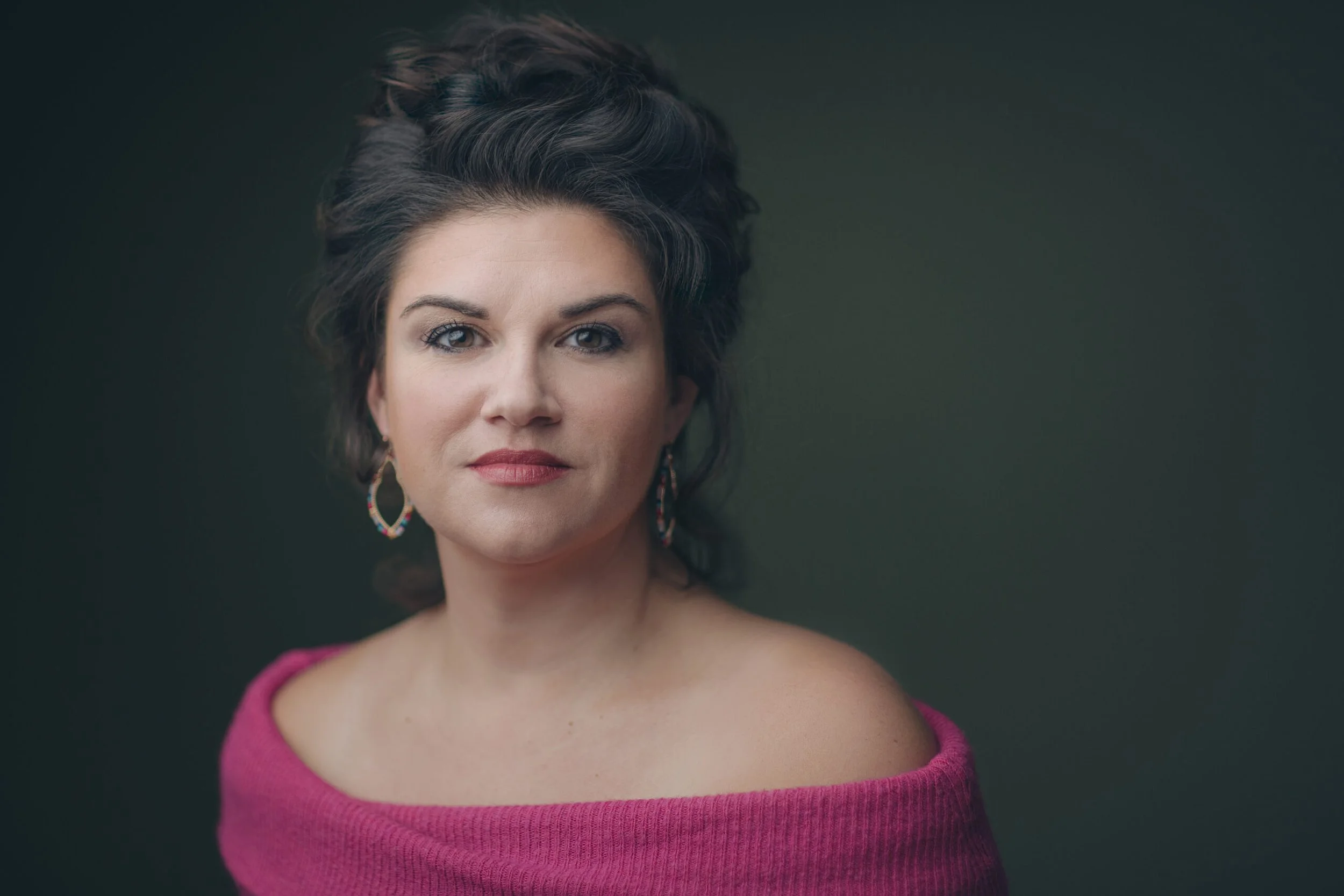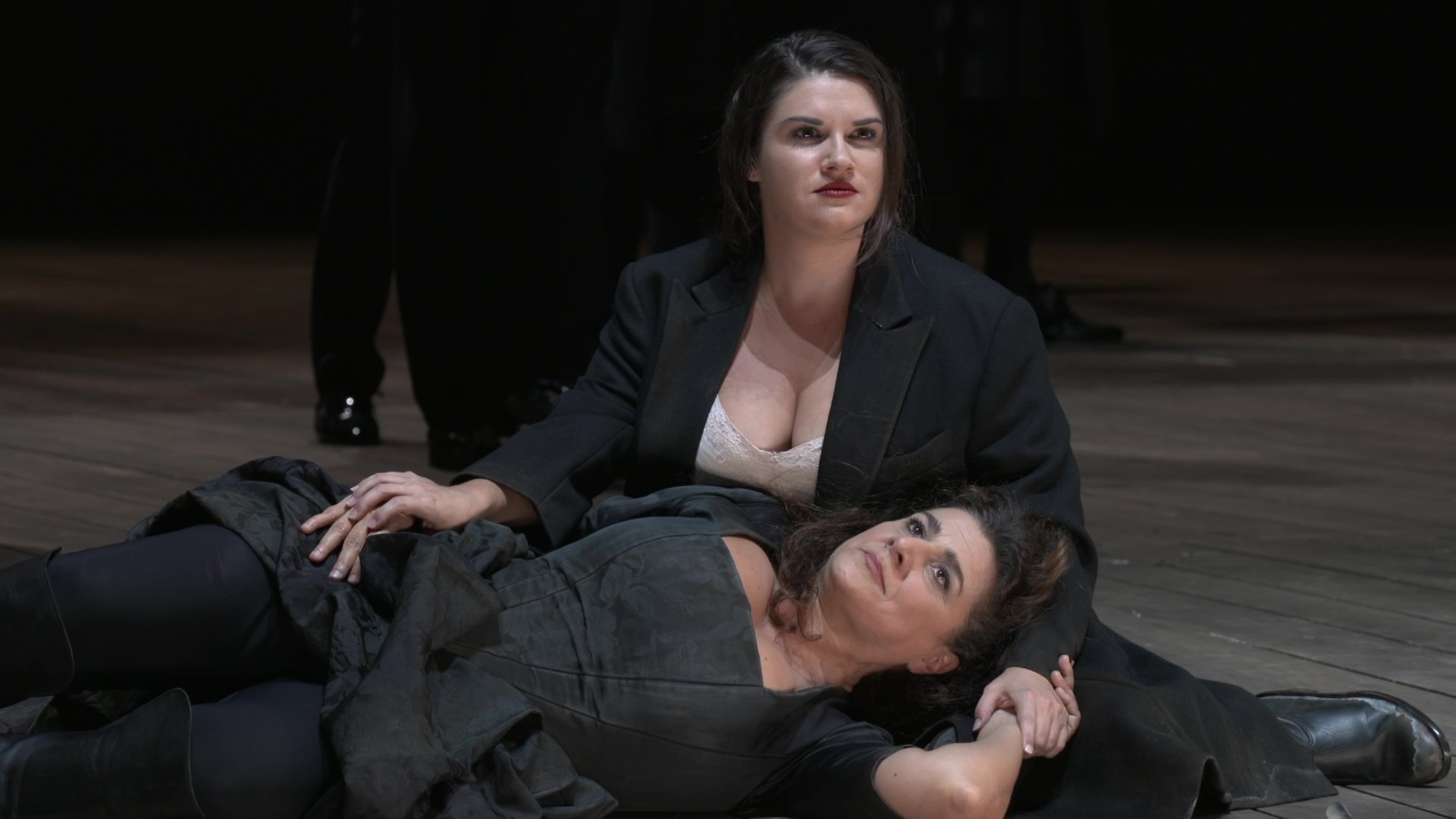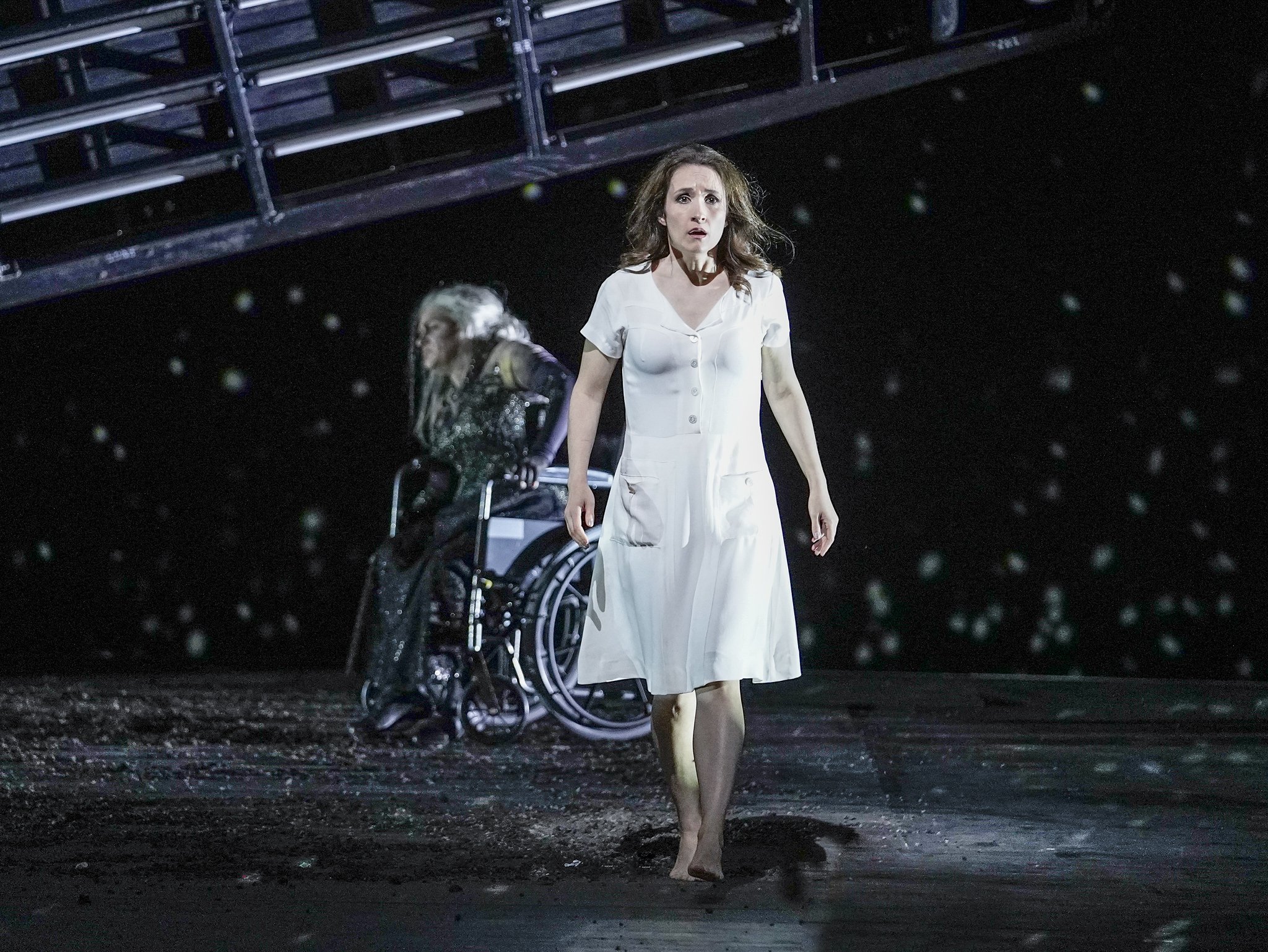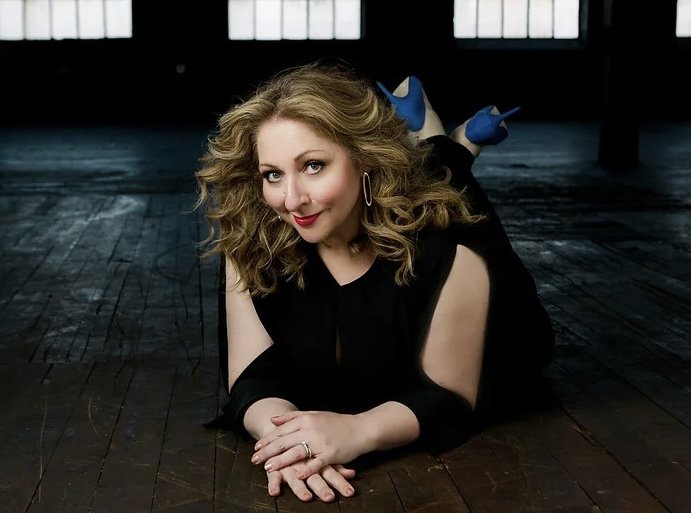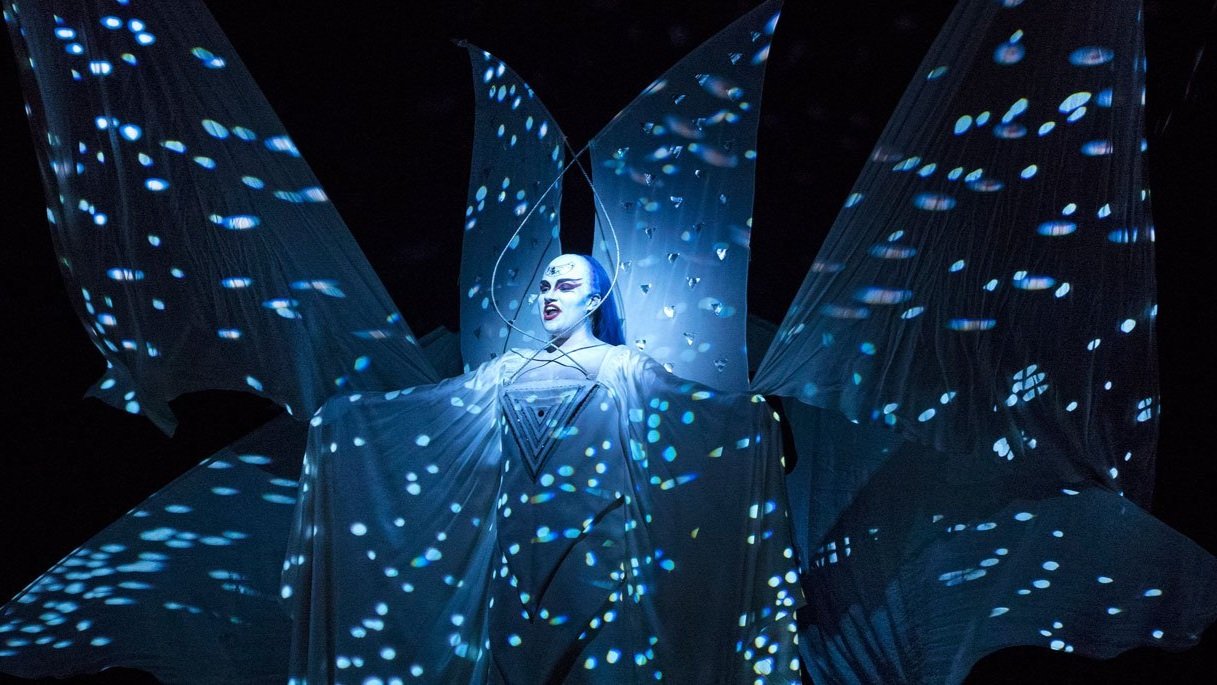An Interview With Kathryn Lewek
Kathryn Lewek
“O Queen of queens, how far dost thou excel!” That’s Shakespeare, but how perfectly does it fit Kathryn Lewek, recognized the world over as the definitive Queen of the Night in Mozart’s Die Zauberflöte, also known as The Magic Flute. The role is one of the most devilishly tricky in all opera, with two mind-blowingly high arias full of staccati and just about 10 minutes of stage time, but Katie Lewek drops your jaw to the floor with the ease with which she sings it. However, though she is undoubtedly best known as the Queen of queens, Katie (as I know her) has far more roles and range up her sleeve than just Mozart’s imperious monarch. When I spoke with her after a rehearsal for her latest run of Flute at the Met, our topics of conversation ranged from Violetta in La Traviata to her early days as a mezzo to why she’s ready to expand her artistic range. Read on!
Which opera was the first you ever saw?
I think the first I ever saw was in Connecticut, I saw Amahl and the Night Visitors, but I don’t really recall that all that well, so I have to say that really sticks out in my mind, that feels like the first, was Pelléas et Mélisande, which Marilyn Horne was in, and I was 10, and it was here, at the Met. It was kind of one of those last-minute things, that it wasn’t on my radar at all. My grandmother was a contralto, and she studied with Louise Homer and she was destined for great things and then my grandfather came back from World War II and she abandoned her career, and that’s what women did then. I’m very fortunate that I’m not in the same position. My grandmother lived in Cape Cod when she retired and my mother lived in Southeastern Connecticut, that’s where I grew up. There’s a bus tour that used to start in Cape Cod and pick up my mom in Connecticut and keep going down to New York. And they would see an opera and a Broadway show and spend a whole weekend in New York. Well, one year, when I was 10, my grandmother was ill, and so my mom woke me up at, like, 5 a.m. and she goes, “What, do you want to go to school today, or do you want to go to New York City and have a HUGE ADVENTURE with me at the opera?” I was, like, “Uhhhh, ding ding ding, not going to school, definitely, hi!” So that’s how I went to my first opera, and I was just enthralled the entire time! I couldn’t even believe the enormity of the space, and just the beauty of it. I was hooked on the space first, and then the opera started and I couldn’t believe my ears, couldn’t believe my eyes — it was incredible. And side note: tomorrow is my final dress rehearsal for Magic Flute and my daughter is coming for the first time.
Side note: this interview was conducted in December. More on Mackenzie’s first opera!
Even though she’s younger then I was when I walked into the Met for the first time, I still feel like she’s going to walk in and just be in awe of the space, you know? It’s pretty amazing… Of course [The Magic Flute is] the greatest [first opera] for every kid. We would have had her come to more things throughout her childhood, except COVID happened, so it not only was impossible because we had lots of cancellations, but also everybody was just worried about having people in the audience or people coming backstage, and it was a really tough time to introduce a little kid to the opera.
What was it like to sing the Queen while pregnant?
It was trippy, especially later on. At first it’s a lot of exhaustion, and you’re sort of not feeling well, so it’s more about just sort of energy-wise getting through shows… I was lucky, though, because I was mostly only singing Queen at that time, and so I wasn’t learning anything else, I wasn’t learning other roles like I am now, which is hard with two little kids at home, certainly, but I’m glad that I can sort of shut the door and not be Mom for a minute and a half, whereas when you’re pregnant, you can’t step away from it. I used to say to my husband, “I wish you could just be pregnant for me for an hour and a half so I could go away and get some work done and take a breather. I’ll do it most of the time, but could you just give me a break? But you know, you just can’t do that when you’re growing a baby inside your body! Now it’s a different story, but it was really, really weird near the end, I sang until I was about eight and a half months pregnant, and I felt a lot like I would warm up for that first aria, “O zitt’re nicht,” and I was singing with one body, and then I would rest, because you need a lot of rest when you’re pregnant. There’s an hour or more in between, depending on the production, and I felt like I had to re-warm up, like I was singing with a different body, because she would move around and then my organs would move around, and I was like, “Where’s my diaphragm? Where am I supporting from?” I just felt like I needed a system reboot every time that I was going to get up and sing another aria.
Did that ever happen in the middle of an aria?
No, but onstage, at Aix-en-Provence, during the Simon McBurney Flute in 2018, when I was very, very pregnant with Mackenzie, I had a contraction during the aria [Der Hölle Rache]. That was the first contraction I’d ever had, and when it’s your first pregnancy, you don’t know what to expect, and I thought, “Am I going to have the baby right here onstage? What’s going to happen?” It was right after the coloratura, so there’s an interlude before “Verstossen sei auf ewig,” and I literally got up and I was, like, [holding her sides] “Oh my, oh my gosh!” So yeah, that was an interesting experience! [laughs]
Katie (left) and Erin Morley in Die Zauberflöte (Karen Almond/Met Opera)
In the Met’s new production of Die Zauberflöte, how did the portrayal of the Queen as an octogenarian wheelchair user affect your vocal interpretation?
It was really difficult, actually. Early on in the run, I had some less-than-perfect performances, and I was still navigating how to deal with that. It seemed like we had so much time to rehearse, but in the end, it wasn’t enough time on the stage. And there was a major difference between rehearsing it in the room and on the stage, for me, specifically the wheelchair, because the stage is raked. And so wheeling around a chair on a flat surface is one thing, but suddenly when you’re wheeling it up a hill, it’s a totally different story, and still having the breath control to make sure that I can do my job. So that took a little finagling, I changed a little bit of the staging, which I ran up by Simon [McBurney] and he was completely pleased with it. It was a learning experience for sure… By the HD, I was very confident and very comfortable with it. I’d gotten over some of the hangups that I was feeling, and I felt really good about that, which was extra special because that was my 50th performance at the Met.
She insists that it was coincidence that her 50th performance fell on HD Day. I’m not so sure.
How has your take on the Queen changed since becoming a mother?
I’m not sure it really has, to be totally honest, because I don’t carry the same kind of mentality with my own mothering as the Queen does—
That’s a good thing!
Yeah! I would say that is a positive thing. You know, I absolutely think that my portrayal of Queen and what I bring to it personally is a genuine thing. It comes from feelings of rage and fury that I’ve had in my own life, and then I can use those experiences to inform how I would act in the moment. That doesn’t mean that I completely identify with the decisions that she makes and what she asks Pamina to do, but I absolutely understand being very frustrated, feeling powerless, feeling like my own persuasion over my life has been lost. So that frustration is very real to me at times, and that’s what I bring into Queen, but it’s just such a different circumstance than being a mother of a 5 and a 2-year-old. I can’t really say that it’s changed my performance of Queen. Vocally, however, after two pregnancies, my voice is a lot more different than it was 5 or 10 years ago. Part of that is age, and part of that is pregnancy. You talk to Christine Goerke or Erin Morley or any other singers who have had kids, and they will tell you that their voices really have changed. I feel lucky, actually, because I was always a little bit on the cusp of Will I ever sing bigger roles or will I be done after I can’t do the coloratura stuff anymore? I’m right now starting to move into bigger repertoire, which is fun.
You have brought so many directors’ visions of Magic Flute to life. If you were to direct it yourself, who would you make the Queen?
You know, I think I’m an extremely skilled director for myself. I’m not sure that I would ever make a very good director for an entire show… I think the best Flutes are ones that are fun and don’t take themselves too seriously, because I think that that was Mozart at heart… Okay, I have this funny, silly idea, where the Queen is sort of obsessed with her appearance and that’s the power that she has, because that has been, unfortunately, sometimes the only power that women have had throughout history, right? So kind of going on that bent, but then making it silly. So she has a giant beehive, and the Three Ladies are her stylists. I’m not exactly sure what Sarastro is in this, but that’s just my silly little micro-idea about the Queen. I think it would be really funny if she looked sort of ridiculous and her power was showing through her physical expression, and her Three Ladies were part of that and sort of buzzing around her at all times.
Maybe he’s the demon barber.
Maybe you should be the director.
I would love to.
Hello, opera world! Make it so.
Katie in The Magic Flute (Evan Zimmerman/Met Opera)
Do you have a favorite of the many stagings, I’ve lost count, you’ve done of Magic Flute?
I’d have to say that I have two, and the reason is basically because they’re two totally different shows. I really love Nicholas Hytner’s from English National Opera, which is no longer really with us, that production has kind of gone away from the lexicon of productions, which is too bad. It was very classic, it was very funny, it was very cute, and it was very, actually, like, women’s liberation, ahead of its time. So I really liked that one, and there was a live bird release, which was lovely.
Must have been fun, especially since, in the original form, it’s really misogynistic.
Oh, yeah. And I loved that that production sort of found ways around that and counteracted it, and for a similar reason, that’s why I like Simon McBurney’s Flute as well, which is extremely difficult to navigate as a performer because it’s almost like a psychological thriller, but I think that it gets to the core of the ideals in the opera, Mozart’s ideals, and that he was not super keen on the misogyny, but completely aware that it was the times, you know, but also that it honors the idea that it’s theater, and looking at the process of theater, I love that about it.
How did you go from a mezzo to the most stratospheric, crazy roles in opera?
I know, it sounds nuts. But it’s actually not as crazy as it seems, because, I mean, the Queen really demands a really dramatic middle voice… my voice is actually the same as when I was a mezzo. I have a pretty dark color and I have a really good low range, which I hardly ever use. I kind of always knew that I had really crazy high notes, but I didn’t think they were worth listening to and I had a break at the top of my voice when my technique wasn’t as solid as it is now, so there were notes I couldn’t sing and then there were notes on top [that I could], you know? So I had a gap around high C, [and] if you’re a soprano and you don’t have a high C, what are you doing? So once I figured that out and got that sorted out, technique-wise, then possibilities were endless… Some of the more recent things I’ve been singing have been taking advantage of more of the middle and lower voice, so it’s been a lot of fun.
What are some dream roles you haven’t gotten to sing yet/a dream role you recently got to debut/a dream role you’re debuting soon?
Certainly Juliette, which I’m singing in [February] for the first time, has been a role that I’ve wanted to sing for a long time. The number one role that I really wanted to sing for a long time, and I waited until the right time, was Violetta. I actually turned down five of them before I took one, for various reasons. At the beginning, I felt like I wasn’t ready yet, there were other things I needed to do first. I had teachers that always encouraged me to be smart about the order in which I did things. So I wanted to honor that, and then someone asked me to do an English Traviata for the first time, and I was like “Uhh, doesn’t really seem like a good first run.” There was one that was just a concert version, and for roles like that that are really important to my career, I always like to do it right the first time, which is why I really love singing at [the Toledo Opera] up in Ohio.
And they love you.
They do! Every time I go up there, they’re like, “Okay, so what’s our next project?” It couldn’t be more ideal, and most of the time, if there is a role appropriate for my husband, they’re like, “Yep!” They’re so happy to have both of us up there. It’s a wonderfully nurturing place to sing first things, and I’ve debuted Lucia and Rosina [there]. I did Zerlina a thousand years ago, which I would never sing anymore, but that’s besides the point! And of course, Violetta, and now Juliette is going to be up there.
Katie in La Traviata (Toledo Opera)
Have you found that Traviata requires three voices for the three acts?
No, I don’t feel that way at all. For me, it’s just all the different parts of my voice, and [in] most operas, I only get to show one, you know? I have a complicated instrument, and I love that Violetta shows that. I love singing all the Hoffmann heroines for the same reason, you know. All in one evening, I get to show off basically my whole repertoire of colors and technique styles and all the different bells and whistles.
How do you handle the challenges of all four of the Hoffmann heroines?
Again, it just feels really natural to me, I just kind of go into autopilot, because I have a certain idea of what I want to communicate and then my voice kind of takes over and does the color that is coming out of me emotionally.
Do you have a favorite one of the heroines?
Antonia.
She’s so sweet!
Yeah, absolutely. I’m singing all four of the heroines at the Salzburg Festival this summer, and they’ve asked me to do the coloratura version of Giulietta’s aria, which I think is really interesting, because it’s fantastically challenging, hardly anybody ever does it, and I think it’s going to just be a load of fun. And the cast, oh my God— Benjamin Bernheim is singing Hoffmann, we have Christian Van Horn singing all the villains, Kate Lindsey is singing Nicklausse, so you’ve got to come to Salzburg this summer, I’m telling you.
Maybe I’ll take a trip just to see you! When will the Met ask you to do Violetta?!
Oh, that’s a really good question. I hope so.
Why is the Met special to you?
It’s the house that I grew up wanting to sing at more than anywhere else. I think, if you’re an Italian, you’d want to sing at La Scala; if you’re German, you’d want to sing in Munich or the Staatsoper Berlin. Everyone has their national house that they grew up hearing about and of course, the Met is actually the best house in the world, you know?
I do know!
What has been your biggest artistic challenge?
Katie (above) and Cecilia Bartoli in Ariodante (HDVD Arts)
Other than the Hoffmann heroines and kind of getting that in my brain, a while ago [in 2017], when I was singing Ariodante in Salzburg with Cecilia Bartoli — the way that that production works is that she starts out very masculine and I start out very feminine, and throughout the entire opera, we sort of switch places. It doesn’t really officially go all the way transgender, but it touches on those overtones, and it was really amazing to kind of find that with her throughout the opera, find the parallels with our characters at times. I found it extremely rewarding to have a character not just go through the changes that are on the page and in the storyline, but also in that particular production, where we added elements of interest that were just really congruous with the times and almost even ahead of the times. It was incredible to kind of add that layer to the complexity of what the characters were going through already… It wasn’t planned to be filmed [but] Cecilia loved the production and the cast so much that she actually sponsored the whole DVD. She was so thrilled with it.
How do you see the future of opera?
Good question. You know, I think that you can look at [Julie Taymor’s] The Magic Flute here as an example of the future of opera, because it is so relatable to a younger generation. I think we need more experiences like that for kids in our society. Over in Europe, where I spend a lot of time, I see people bringing their children to operas all the time. It’s not a gray-haired activity like it is a lot of the time in the US. So I think it’s important that we have more experiences like The Magic Flute here at the Met and opera outreach and stuff through regional companies, where we can expose kids to opera.
Do you have any plans or desire to sing modern opera?
I’ve got a project coming up with Matthew Aucoin and Peter Sellars later this season, which I’m really excited about. I’ve done a few projects a while ago with new opera, and I really enjoyed it, but when I started having children… For a person that doesn’t have perfect pitch, it’s an incredible time investment, and I’m a perfectionist, I need everything to be just so, I need everything to be 100%, so I didn’t take on big projects like that for the last six years or so. I’m diving back.
What can we do to ensure that opera keeps thriving for Mackenzie and Charlie?
It’s connected to creating more opportunities for kids to feel like opera is accessible to them with opera outreach. It’s frustrating to me — I’m not going to name names, but my husband was singing a Verdi Requiem somewhere in the US. My daughter was less than a year old and I brought her into the hall. Of course, she was completely silent, it was a rehearsal, and the conductor’s assistant kicked us out. And I thought, Really? [Mackenzie] didn’t disturb in any way. We were way in the back of the hall and I was completely prepared. If she makes one peep, I’m taking her out. The choir chitter-chattering to each other onstage were making more noise than she was. And I thought, If this is the attitude that a conductor has when it’s a rehearsal, how can kids ever fall in love with classical music? It was disgraceful to me. So we need the opposite of that kind of mentality and experiences for kids, [that’s] how we get classical music and how we get opera thriving for generations to come.
Will you ever get tired of singing the Queen?
Obviously I’m eager and ready to expand my artistry into other roles, but it’s also my role as an artist to keep finding ways to keep Queen interesting for me and the audiences, even though I’ve sung 30+ productions or whatever. I want to do that same kind of thing with other roles, ones that give me more expansive opportunity, like Violetta, like Lucia, like the Hoffmann heroines, and I’m eager for these possibilities with other roles… Queen is an exciting role to sing every time and I’m never bored onstage, but I’m ready for the next phase of my career.

